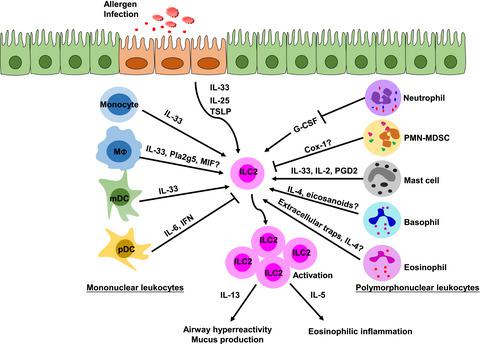当前位置:
X-MOL 学术
›
Immunology
›
论文详情
Our official English website, www.x-mol.net, welcomes your feedback! (Note: you will need to create a separate account there.)
Role of myeloid cells in the regulation of group 2 innate lymphoid cell-mediated allergic inflammation.
Immunology ( IF 6.4 ) Pub Date : 2020-07-01 , DOI: 10.1111/imm.13232 Aihua Lei 1 , Yumei He 2 , Qiong Yang 3 , Xiaofang Li 1 , Ranhui Li 1
Immunology ( IF 6.4 ) Pub Date : 2020-07-01 , DOI: 10.1111/imm.13232 Aihua Lei 1 , Yumei He 2 , Qiong Yang 3 , Xiaofang Li 1 , Ranhui Li 1
Affiliation

|
Group 2 innate lymphoid cells (ILC2s) are an important component of the innate immune system that execute important effector functions at barrier surfaces, such as lung and skin. Like T helper type 2 cells, ILC2s are able to release high amounts of type 2 cytokines that are essential in inducing allergic inflammation and eliminating helminth infections. The past few years have contributed to our better understanding of the interactions between ILC2s and other cells of the immune system via soluble factors or in a cell–cell contact manner. Myeloid cells, including mononuclear leukocytes and polymorphonuclear leukocytes, are excellent sensors of tissue damage and infection and can influence ILC2 responses in the process of allergic inflammation. In this review, we summarize recent insights on how myeloid cell subsets regulate ILC2 activation with focus on soluble factors in the context of allergic inflammation.
中文翻译:

骨髓细胞在调节第 2 组先天淋巴细胞介导的过敏性炎症中的作用。
第 2 组先天淋巴细胞 (ILC2) 是先天免疫系统的重要组成部分,可在肺和皮肤等屏障表面执行重要的效应子功能。与 T 辅助型 2 细胞一样,ILC2 能够释放大量 2 型细胞因子,这些细胞因子对于诱发过敏性炎症和消除蠕虫感染至关重要。过去几年有助于我们更好地了解 ILC2 与免疫系统其他细胞之间通过可溶性因子或细胞 - 细胞接触方式的相互作用。髓系细胞,包括单核白细胞和多形核白细胞,是组织损伤和感染的极好传感器,可以影响过敏性炎症过程中的 ILC2 反应。在这次审查中,
更新日期:2020-08-27
中文翻译:

骨髓细胞在调节第 2 组先天淋巴细胞介导的过敏性炎症中的作用。
第 2 组先天淋巴细胞 (ILC2) 是先天免疫系统的重要组成部分,可在肺和皮肤等屏障表面执行重要的效应子功能。与 T 辅助型 2 细胞一样,ILC2 能够释放大量 2 型细胞因子,这些细胞因子对于诱发过敏性炎症和消除蠕虫感染至关重要。过去几年有助于我们更好地了解 ILC2 与免疫系统其他细胞之间通过可溶性因子或细胞 - 细胞接触方式的相互作用。髓系细胞,包括单核白细胞和多形核白细胞,是组织损伤和感染的极好传感器,可以影响过敏性炎症过程中的 ILC2 反应。在这次审查中,



























 京公网安备 11010802027423号
京公网安备 11010802027423号